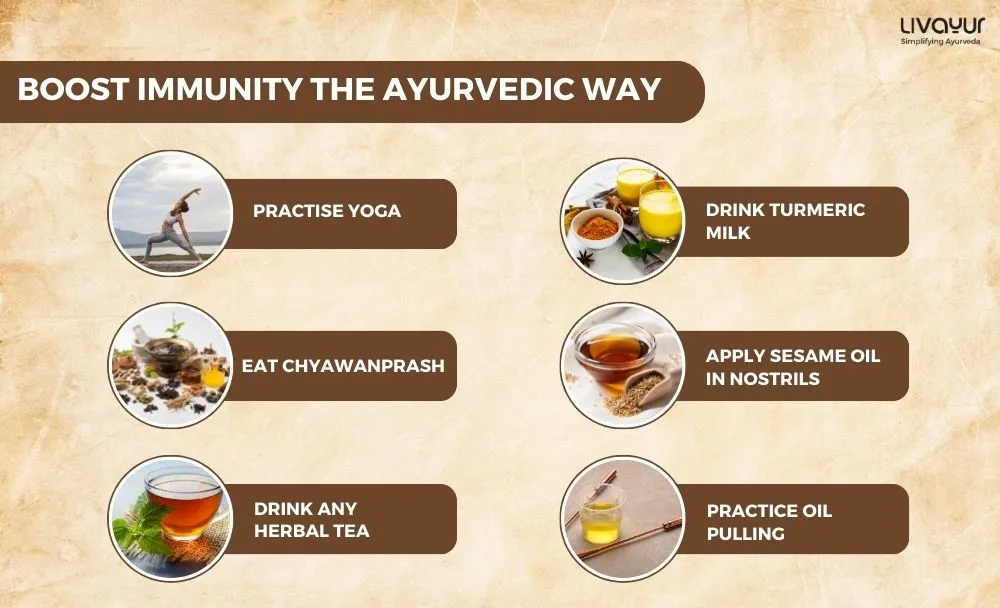
We all know about immunity and its role in preventing and fighting diseases. However, did you know that there are two main types of immunity?
In this article, find out about the types of immunity and the difference between them. Also, uncover means to boost your immunity with the help of Ayurveda.
What Is Immunity? (1)
Immunity is the ability of the immune system to defend and protect the body from outside invaders like bacteria, viruses, fungi, toxins, etc. There are two main types of immunity:
- Innate immunity
- Adaptive immunity
Innate Immunity vs Adaptive Immunity (1)
Innate immunity is the immunity you are born with, whereas adaptive immunity is the one you develop when your body is exposed to microbes or chemicals released by microbes. These two types of immunity work together to shield the body from disease-causing organisms.
Innate Immunity: In Detail (1)
Innate immunity is the rapid response system of your body, meaning it is the first to respond when an invader attacks your body. It is inherited and is active from the moment you are born.
Some of the main parts of this immune system are the skin, the eye’s cornea and the mucous membrane that lines the respiratory, gastrointestinal and genitourinary tracts. All these parts of the body act as the primary physical barrier to protect the body from harmful germs, parasites, cancerous cells, etc.
When an invader comes into contact with these organs, the innate immune system surrounds it and kills it inside the immune system cells, called phagocytes, thereby protecting your potential diseases.
Acquired Immune System: In Detail
Acquired immunity is the immunity that develops with exposure to disease-causing organisms. When your body finds an invader, the acquired immune system, with the help of the innate immune system, makes special proteins called antibodies to fight this invader (1).
Although it may take several days for your body to develop antibodies the first time, after the initial exposure, the immune system will recognize the invader easily the next time and defend against it. However, the acquired immune system may also change during your life (1).
Immunisation, or vaccination, is one of the best examples of this type of immunity. It is a way to trigger the immune response and activate immune system memory against a specific invader, allowing your body to react quickly and efficiently to future exposures (2).
Concept of Immunity in Ayurveda (3)
Immunity, in Ayurveda, is called Vyadhiksamatwa. Innate immunity can be correlated to Sahaja Bala, and acquired immunity can be correlated to Kalaja/Yuktikrita Bala and Yuktikrita Bala, mentioned in Ayurveda.
Ayurveda emphasises a lot on immunity. The fundamental concept of Ayurveda even revolves around preventing diseases, which is also the main goal of the immune system. Therefore, Ayurveda recommends many lifestyle and dietary tips to boost immunity in the body.
How To Boost Immunity the Ayurvedic Way? (4)
- Practise Yogasana, Pranayama and meditation every day for at least 30 minutes.
- Take Chyawanprash in the morning.
- Drink any herbal tea once a day. Some of the best herbs for immunity are Tulsi, cinnamon, black pepper, and Sonth or dry ginger.
- Take turmeric milk or Haldi Doodh.
- Apply sesame oil or ghee into your nostrils.
- Practice oil pulling through sesame or coconut oil every morning.
On a Final Note
There are two types of immunity, viz innate immunity and acquired immunity. While innate immunity is the one you are born with, acquired immunity is the one you develop when you come into contact with a foreign invader. Both these immune systems work together to protect the body from diseases and are equally important.
References
- https://www.hopkinsmedicine.org/health/conditions-and-diseases/the-immune-system
- https://medlineplus.gov/ency/article/000821.htm
- https://japsonline.com/admin/php/uploads/79_pdf.pdf
- https://www.mohfw.gov.in/pdf/ImmunityBoostingAYUSHAdvisory.pdf


























1 Comments